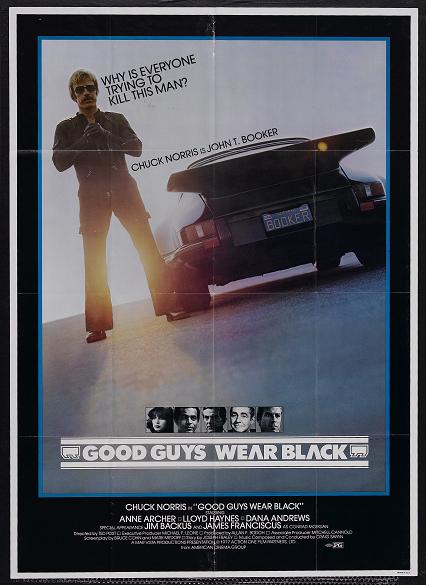
[THE CHALK-OUTLINE]
Good Guys Wear Black (1978): Breakdown by RANTBO
A former elite-CIA special operative is targeted by former allies for surviving a senator’s botched peace negotiations in which a deal was struck… being Chuck Norris.
[THE GOOD, THE BAD AND THEIR BADASSITUDE]
THE HERO:
![]()
Chuck Norris is Major John T. Booker aka Tiger One
You don’t even have to wait for a single ill-choreographed kick to confirm it, Chuck Norris is Major John T. Booker. An ex-CIA commando turned—political—science—teacher?… Hmm. Well, despite the fact that after ‘Nam, Booker has become a liberal pussy, the guy still knows martial arts. But the bulk of his badassitude comes to us residually, from his past as a member of an elite government assassination troupe known as The Black Tigers. Yes, BLACK Tigers. With his blonde hair and pasty inconsistent (somehow always slightly sunburned) skin and gee-golly Brady Bunch demeanor, one assumes that Booker would have to have been one psychotic son-of-a-bitch back in the day to be accepted into a group with such a militant and threatening moniker. Not only that, but imagine what insane acts he must have performed to become their respective leader, which he was… Come to think of it, where’s that movie?
Of course, after the exciting (yet far too short), first act excursion in Vietnam, the meat of the story follows Booker five years later in California. Gone are his fatigues, facepaint and machineguns; in are turtlenecks, too-tight pants and giant sunglasses. However, Booker has also donned a post-war mustache, so the rest of his goofy attire is all but forgiven. And in an assumed attempt to balance out his sissy left-wing professor day-job, Booker keeps himself in bad-ass shape by driving around in fast cars (license plate: BOOKER), uncovering government conspiracies and battling the ghosts from his far more interesting past. Plus, he doesn’t eat lunch. Ever. And I think we all know the ballsy risks involved in skipping core daily meals, amirite? So, all-in-all, Booker is a clear step-up for Chuck on the ladder to action heroism, but it’s still a 70s era step. And as such, the premise of the character out-bad-asses the final product.
THE VILLAIN:
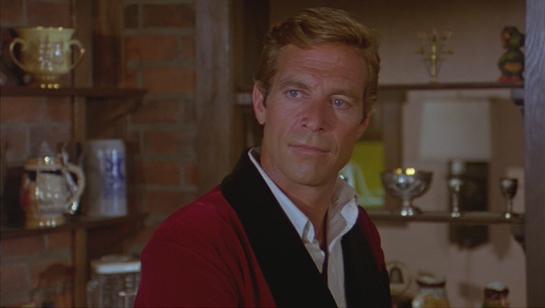
James Franciscus is Senator Conrad Morgan
Mr. Bathrobe and Dagger. In his two or three scenes as the Senator, Franciscus masters the smarmy bottom-line, evil-politician-bent-on-staking-oval-office-claim. Morgan excuses his acts of treason, murder and general douche-baggery as an “expedient” means toward the greater good. ‘Greater good’ meaning a higher salary and standing for himself. He even goes so far as to correlate his corrupt deeds to the past (read: constant) American transgressions of anti-suffrage, slavery and war, viewing these acts as a positive for “expedient” societal and cultural growth. Our savior. However, aside from appearing in the convoluted explanatory bookends of the film, the Senator’s evil deeds are all carried out through his network of faceless spies and goons, essentially making Morgan a really lame Bond villain and hardly a bad-ass. Sorry, Conrad.
[THE SEX AND VIOLENCE]
DUDESWEAT AND MACHISMO:
This one was a kind-of a toughy as Booker spends most of the film completely uninterested in women…
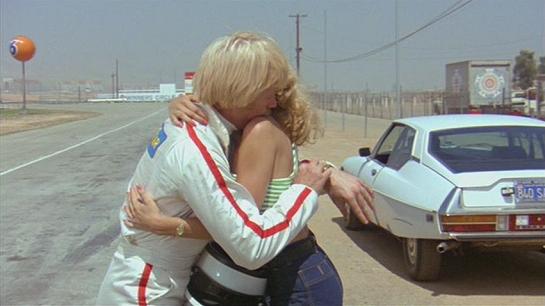
Booker: [on his race car] I think our troubles with this baby are just about history!
Booker’s Friend: You spend one more minute on this car, I think that baby down there [pointing to Booker‘s pissed off girlfriend, Kelly], is going to be history.
Booker: Damn! Can you believe I forgot all about her?
Booker’s Friend: Any man who forgets something like that needs a lube job and an oil change REAL bad!
Booker: [back on the car and continuing to ignore Kelly] I can’t wait to get her on the rack!
…but then again he also flirts around with a reporter. Wait, did I say “flirt”? I meant straight up asks for pussy:
Booker: [ten minutes after meeting a woman]: So, do you fool around?
And as much as I’d like to believe he was talking about goofing off and telling jokes, he wasn’t. ‘Cuz he confirms the context of his query to her directly after he finds out she’s easy as Mac & Cheese. HOWever, as soon as his closest comrade from the war, Mhin, is revealed to be alive, Booker loses all affection toward the woman, prompting her to become insecure and questioning about his interest in her. Which, from that point on, he seems to only feign in an attempt to shut her up. You see, Booker just got all wrapped up in his post-traumatic stress to remember how great it was to be a young stud in the heat of battle with other ripped sweaty career jar-heads. Thankfully, he comes around.
EXPLOITATION AND MISOGYNY:
Norris has sex. With a woman. And once again, just like in Breaker! Breaker!, he’s immediately ashamed of it.
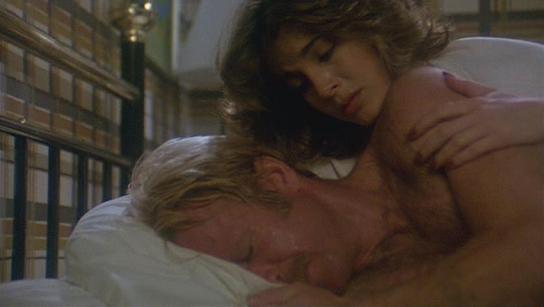
Poor Chuck. I personally blame Richard Roundtree and Shaft for making sex with the ladies such a 70s action-movie cornerstone. Now while sex with a man wouldn’t automatically instill exploitation or misogyny, the fact that Marilyn/Margaret (or whoever the reporter Anne Archer plays is), uses her vagina to bait and extort information from a sexually confused and emotionally unstable Booker is just shameful. Thankfully the movie course-corrects her evil deeds by blowing her up in a plane explosion. Marilyn/Margaret, signing off. Heh-heh-heh.
MURDER BY NUMBERS: [ 42 ]
Click HERE for the Body Count Breakdown
With ninety percent of the 40+ kills taking place within the first twenty or so minutes and nearly all of those are in just one sequence of war, Good Guys contains a hefty, yet disproportioned total. It’s a pretty good sequence, don’t get me wrong, but much better suited for a finale. As one would expect, there’s plenty of typical modern warfare carnage: gunfire, grenades and explosions that decrescendo during the second act into single-shot deaths and a drowning. Norris, however, does manage to rack up an impressive (for the time), nine kills, including yet another (Breaker! Breaker!) one by kicking. So the film wasn’t a complete downward spiral.
MOST SATISFYING ASS-KICKING AND/OR DEATH:
Booker vs. Mhin
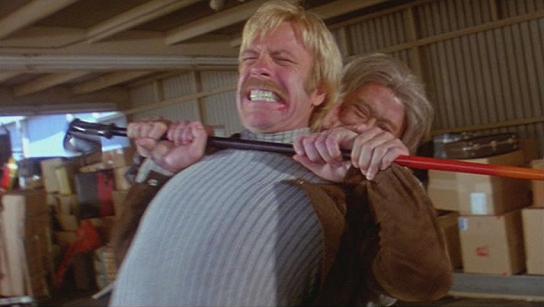
This showdown between former brothers-in-arms (amongst other implied body parts), comes to a head just after Mhin takes their love-triangle pickle into his own hands by blowing up Booker’s potential hetero-life mate. Overcome with rage, Booker catches up with Mhin in the parkinglot of the airport and the two have an all out grudge match. Punches are thrown, kicks whip through the air and Booker almost gets stabbed and chocked to death with a ski-pole. It’s all very exciting. Well, that is to say, as exciting as this film ever gets…
[THE BEST OF THE REST]
EPIC MOMENT:
The Foot Of The Tiger
The money-shot and subsequent focal point for the film’s marketing, is also my favorite moment in the picture.
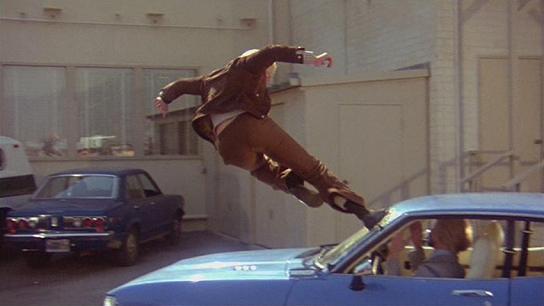
After being the recipient of a couple/ten kicks to the face and upper torso, Mhin flees the fury of Booker by chucking a woman his way and jumping into his getaway car. Not one to be made a bitch, Booker bounces back by, well, bouncing. Into the air and foot extended, Chuck Norris’s stunt-double flies through the air, crashes through Mhin’s windshield and crushes the double-crossing bastard’s face with his mighty centrifugal boots of revenge.
BEST LINE:
Booker: [laying the verbal smackdown on Morgan] It’s not that you don’t deserve to be Secretary of State. You don’t deserve to live.
[THE EXECUTION]
Good Guys is not a good film. That (and a bunch of upcoming bile) said, it isn’t completely without merit. For what he had to work with, the film was pretty well directed by multiple-time Eastwood collaborator Ted Post (Hang ’em High and the equally great Magnum Force). With a clear intention to amalgamate his previous work and the oh-so popular-at-the-time martial-arts film. And, inadvertently, Post (in a way) jump-started (or at least, aiding in jump-starting) one of the most popular cinematic story tropes of the time: re-fighting the Vietnam war. But something’s not quite right here, and I know what it is: The story is convoluted shit.
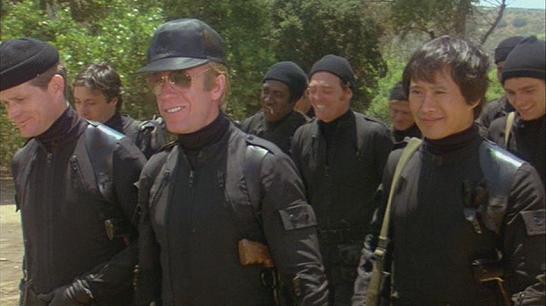
Much like First Blood, Good Guys attempts to bring the war back to America (always a fun choice). But before doing so, the screenwriters blow the film’s finale action-wad in a ‘Nam backstory battle during the first 20 minutes. An act which unintentionally floods the movie’s tank and leaves it choking on the fumes of lame martial arts choreography, penny-to-the-pound Bondian set-ups and extended monologues of benign minutia that make zero fucking sense…
Booker: At first, I assumed he worked for them, whoever “they” were. But of course, “they” are you, and you are all one.
Morgan: I see. “We have met the enemy and they is us.” … “We” is us.
Booker: Perhaps.
Yeah! Wait—but, huh? Those are actual fucking lines! Needless to say, this one might take a paragraph or two to explain, but here’s the story—so far as I can gather…
Back in 1973, one Senator Conrad Morgan, the chief delegate diplomat in negotiating the terms of the end of Vietnam war, made a deal in Paris with Kuong Yen, the North Vietnamese negotiator. The deal called for Yen to release certain key CIA POWs in exchange for Morgan setting-up a death-trap for an elite group of CIA assassins, known as the Black Tigers. The treaty signed, the Black Tigers were sent into the jungles of ‘Nam to their unknowing demise, under guise that they were on mission to liberate American POWs.
Now, if you’re like me, you’re probably asking, “So, why did Yen want Morgan to set-up the Black Tigers as his part of the bargain?”. This is explained in the following dialogue:
Booker: We were set-up!
Harolds (another, slightly less evil negotiator): Oh, yes.
Booker: What was the deal?
Harolds: When I was a younger man, I knew I was going to be Secretary of State or perhaps even President. If I tell you the answer to that question I may not even be afforded the opportunity to retire next year with the modicum of dignity left to me.
Translation: Writing political thrillers was not Bruce Cohn or Mark Medoff’s day job. Something a quick trip to their IMDb pages will all but confirm.
However, the truly important thing to understand is that the negotiators failed to realize one thing: the commando’s team leader was one Major John T. Booker. So, needless to say and despite all odds, Booker survives. As do the four men wise enough to have remained in his general vicinity. Skip to the meat of the story (read: the chase sequences and spin-kicks). ‘5 Years Later’ , Booker is suddenly thrown back into his past when the election of Morgan to Secretary of State spurs Yen to blackmail his ex-negotiations buddy into making good on his un-finished deal: The extermination of the Black Tigers. Though we still never find out why he wants them dead. In fact, we never even see this Yen or…Ooo, look! Chuck’s kicking a guy off a motorcycle!…
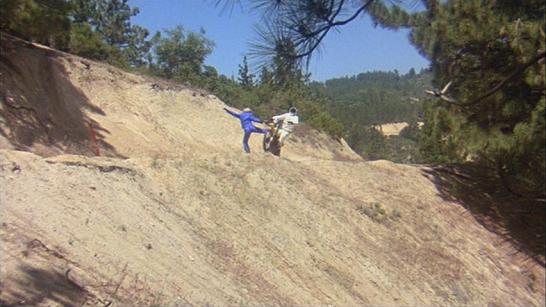
Speaking of shit that doesn’t make sense: the film’s title, Good Guys Wear Black. While it’s clear it refers to the Black Tigers and their all black field outfits, I don’t know exactly what makes a group of spook assassins so “Good”, as their job consists of covert political killings and whatnot…So at best, ‘Good’ is a pretty selective adjective and begs the obvious question ‘For whom?’. But much like the plot of all this, it’s left ambiguous and nobody seems to have given a shit.
Much like Norris’s previous film, Breaker! Breaker!, the fight choreography leaves much to be desired. Improved from his last outing, to be sure, but stilted just the same. Chuck has noticeably evolved and seems comfortable taking on a lot of men at one time, not to mention he is sometimes fighting up to three guys at once. Lame joke, I know, but I needed something gay to segue into the score—which is porn music.
With a light touch of 70s soul, the soundtrack leans on a soft jazzy saxophone like a fat man on a crutch, giving the film an embarrassing ‘so-bad-it’s-good’ vibe, without really having to deliver much of anything. As outside of the ‘Operation: Phoenix’ setting-up of the Tigers, the film sticks to a much more pre-Dirty Harry political procedural flow. But with karate. It’s kind-of hard to explain.
The main problem though with Good Guys is that it suffers from what I call ’70s Actioner Lag’. Something which I’ll allow the tell-tale signs to explain: long (usually stock) shots of mountains and cityscapes; at-length monotone discussions in puke colored living-rooms that seem to double as business offices; drawn out scenes of mundane activities such as driving, jogging and making food, etc. You know, a bunch of time-wasting shit the next generation of Bad-Ass Cinema replaced with gore and montages of sweaty men doing things with their muscles in support of a better, more fascist tomorrow. Which reminds me of another odd, clearly not-yet-80s scene Good Guys had; Booker lectures to a bunch of kids on the failures of America’s part in the Vietnam war and jokes about singing patriotic songs the following week to atone. No shit. Chuck Norris was once filmed portraying a born-again pacifist critical of our government going to war (not in canceling it mind you, participating all together)! Say it isn’t so, Chuck! Say it isn’t so!!!
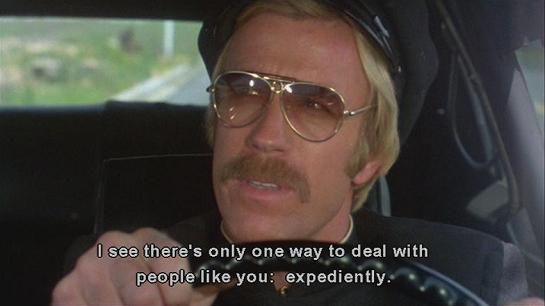
So, yeah. It’s weird and goofy shit like that that makes me kinda like this otherwise pretty dull flick. Once again, the first act is surprisingly well crafted and, with what must have been a very low-budget, extremely well shot and put together. Especially the attack on the fake POW camp. It’s clear that this 15 minute chunk of awesome left some-kind of impression on Norris too, as he went on to “re-make” it again and again over the next decade with his far superior Missing In Action films. So, in a way Good Guys did serve a good purpose. It was ahead of it’s time in this respect and helped to pave-the-way for more-better-action. And aside from those lazy writers, I believe that everyone involved tried their best. But sometimes you just can’t compete with a ponderous and tiresome script that goes to great lengths to explain nothing. So, much like Breaker! Breaker!, I’d recommend Good Guys Wear Black for budding Chuck compliments and anyone interested in watching the building blocks of Braddock, but not so much for casual action fans, as there are far, far better films from the time period that capture the anger and fury of the post-war era. Like First Blood. Yeah… First Blood. Go re-watch that and leave the Good Guys for hardcore wackos like me. You’re welcome.
[THE MORAL OF THE STORY]
When betraying a team of elite CIA assassins, it’s probably best to—just not. Especially if they are lead by Chuck Fucking Norris, you dummies.
[THE AOBG ACTION CHECKLIST]
[X] Athlete(s) Turned “Actor” [Norris]
[X] Clinging To The Outside Of A Moving Vehicle
[X] Crotch Attack
[X] Dialogue Telling Us How Bad-Ass The Main Character(s) Is/Are
[ ] Ending Featuring An Ambulance, A Blanket or A Towel
[ ] Factory/Warehouse/Castle
[X] Giant Explosion(s)
[X] Heavy Artillery
[X] Improvised Weapon(s)
[X] Macho Mode(s) Of Transportation
[X] Main Character Sports Facial Accessory(s)
[ ] Manly Embrace(s)
[ ] Notorious Stunt-Man Sighting
[ ] Passage(s) Of Time Via Montage
[X] Politically Fueled Plot Point(s)
[X] Senseless Destruction Of Property
[X] Shoot Out(s) and/or Sword Fight(s)
[X] Slow-Motion Finishing Move(s)/Death(s)
[X] Stupid Authoritative Figure(s)
[X] Substance Usage and/or Abuse
[ ] Tis The Season
[ ] Torture Sequence(s)
[ ] Unnecessary Sequel
[X] Vehicle Chase(s)
[X] Vigilante Justice
[TOTAL: 17 outta 25]
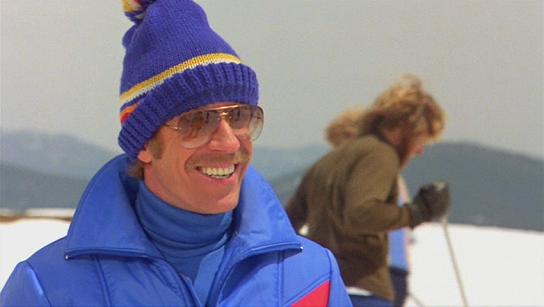
Good Guys Wear Black (1978) © Action One Film Partners, Ltd. / Review © AllOuttaBubbleGum.com and Ty ‘RANTBO’ Hanson